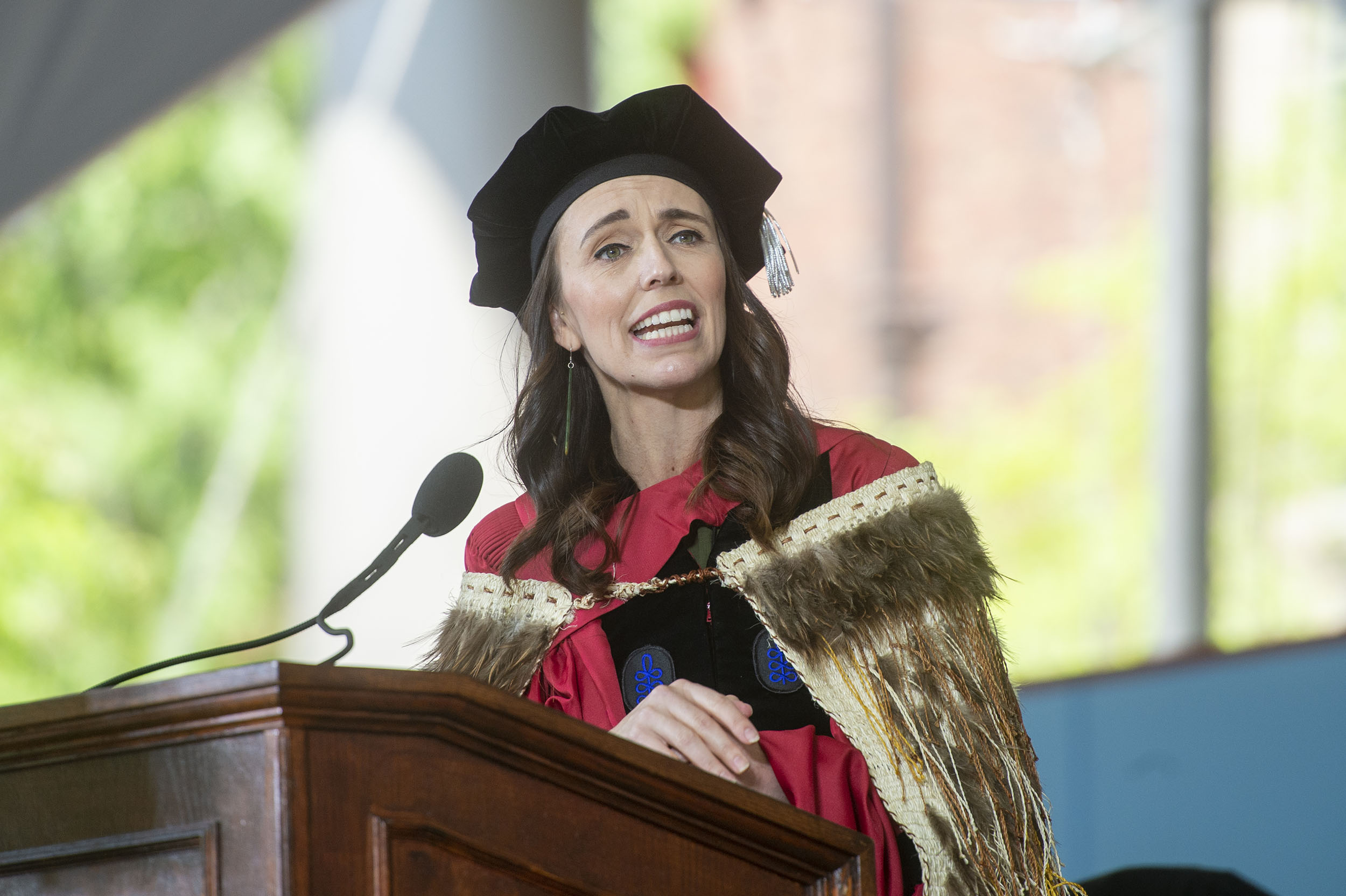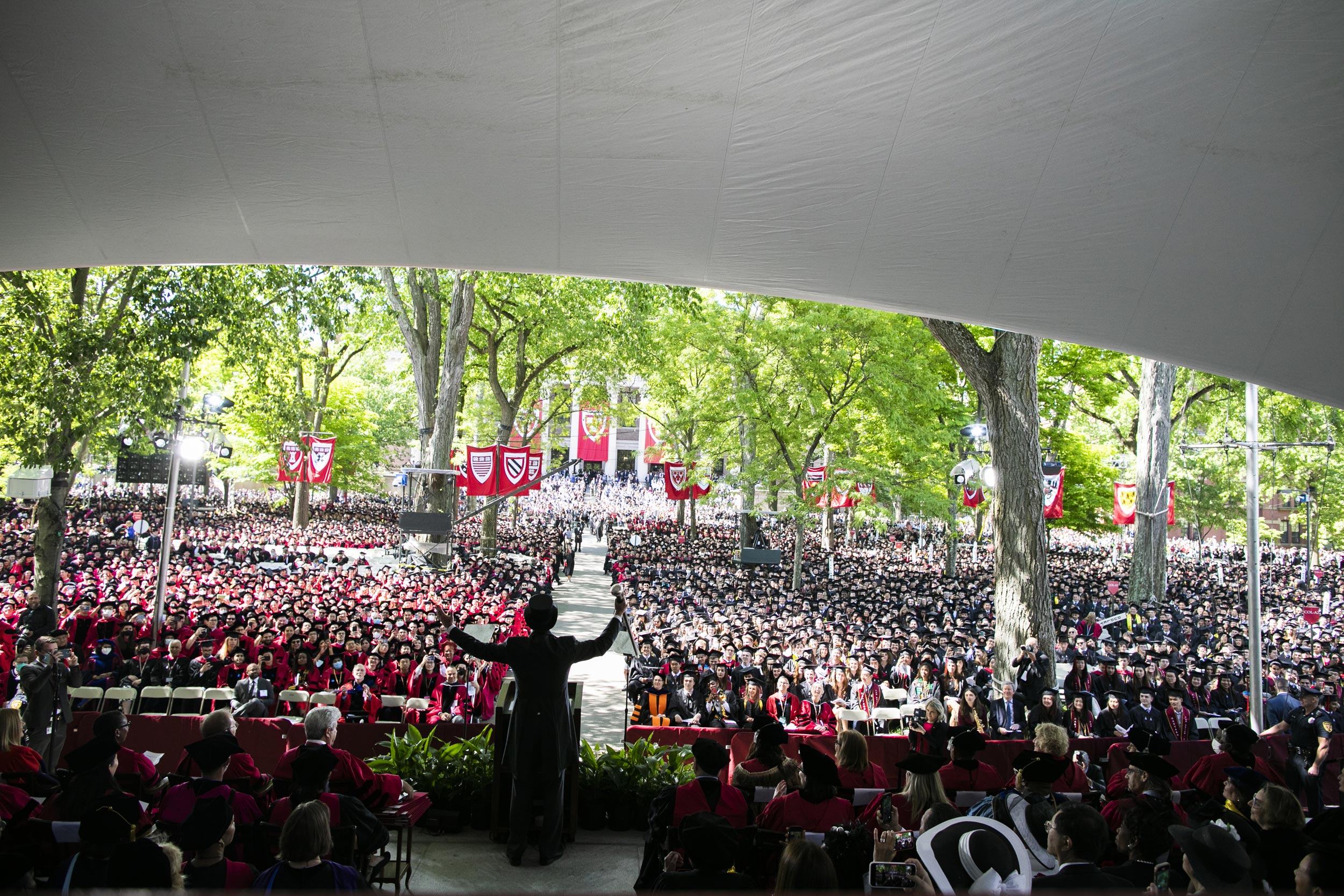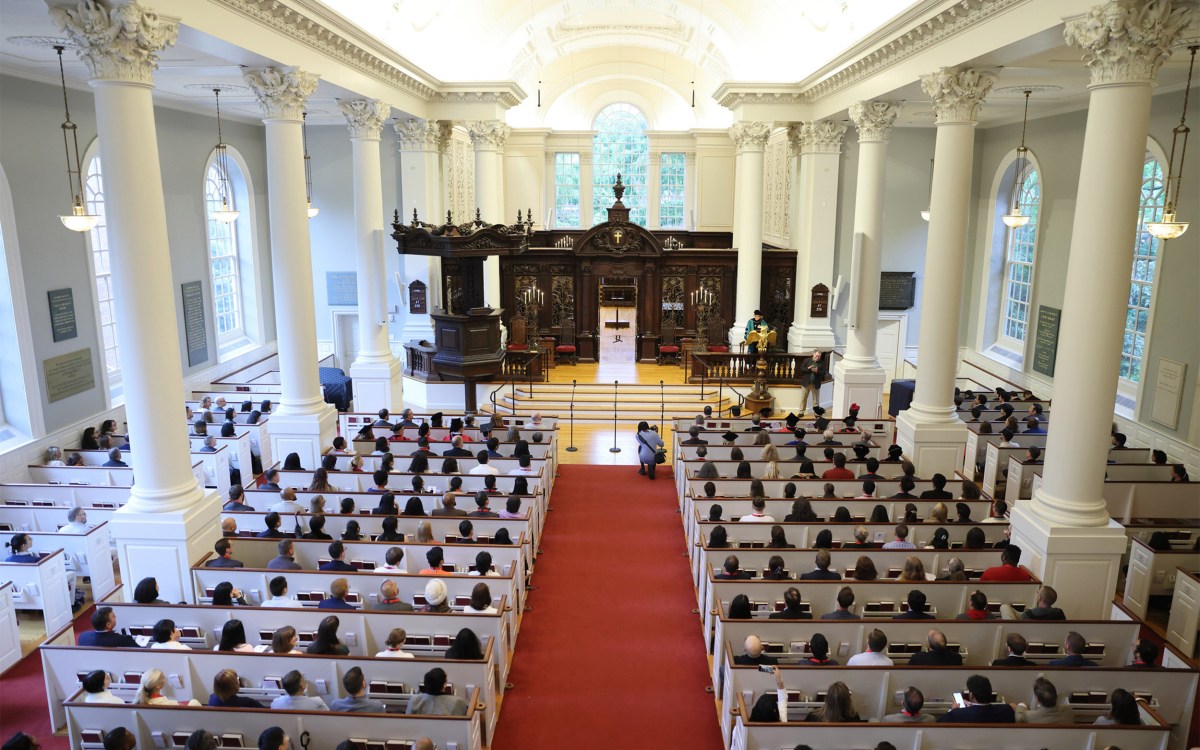
New Zealand Prime Minister Jacinda Ardern spoke at the first Harvard Yard Commencement since 2019.
Jon Chase/Harvard Staff Photographer
Ardern’s forceful reminder: Democracies can die
Prime minister of New Zealand uses Commencement address as call to action on erosion of trust, urging social media reforms and end to tribalism
After the 1787 Constitutional Convention, Benjamin Franklin was asked whether the U.S. would be a monarchy or a republic. “A republic, if you can keep it,” was his response. Two centuries later, at Harvard’s 1989 Commencement, Pakistani Prime Minister Benazir Bhutto echoed Franklin’s warning: “We must realize that democracy … can be fragile.”
New Zealand Prime Minister Jacinda Ardern offered a similar reminder at Commencement on Thursday, updating the theme for our times. When facts and fiction have become a matter of opinion and the trust that underlies democracies is being eroded, blind faith in the resilience of democratic governance is shortsighted, she said.
“It ignores the fact that the foundation of a strong democracy includes trust in institutions, experts, and government — and that this can be built up over decades but torn down in mere years,” Ardern said. “It ignores what happens when, regardless of how long your democracy has been tried and tested, facts are turned into fiction and fiction turned into fact. … It ignores the reality of what we are now being confronted by every single day.”
Ardern laid part of the blame for misinformation on social media platforms, the companies that run them, and the algorithms that create internet echo chambers.
“I’m not here to argue that social media is good, nor bad,” she said. “It’s a tool. And as with anything, it’s the rules of the game and the way we engage with it that matter. That means recognizing the role they play in constantly curating and shaping the online environments that we’re in — that algorithmic processes make choices and decisions for us, what we see and where we are directed, and that at best this means user experience is personalized and at worst it means it can be radicalized.”
Ardern noted the 2019 murder of 51 people in two mosques in Christchurch, New Zealand. The shootings were livestreamed on social media. Investigators found that the killer had been radicalized online.
“The time has come for social media companies and other online providers to recognize their power and to act on it,” said Ardern, whose government passed restrictions on semiautomatic firearms and high-capacity magazines after the killings. Ardern pointed out that individuals also bear responsibility. How we use technology is an individual decision, she said, as is how we interact with those with whom we disagree.

The ceremony was opened and closed by Memorial Church’s bells, and the call of the Sheriff of Middlesex County Peter Koutoujian.
Stephanie Mitchell/Harvard Staff Photographer
“How you choose to engage with information, deal with conflict, or confront debate; how you choose to address being baited, or hated — it all matters,” Ardern told the graduates. “The issues we navigate as a society will only intensify. The disinformation will only increase. The pull into the comfort of our tribes will be magnified. But we have it within us to ensure that this doesn’t mean we fracture.”
Ardern spoke at the first Harvard Yard Commencement since the pre-pandemic year of 2019. The Classes of 2020 and 2021, whose mid-pandemic achievements were marked with online celebrations, will be honored in person on Sunday.
The ceremony was opened and closed by Memorial Church’s bells, and the call of the High Sheriff of Middlesex County. Smiles were abundant, as were proud parents, and graduates cheered and waved props — plastic gavels, globes, and other markers of their disciplines — when their turn came to be recognized.
But reminders of troubled times — war, illness, and mass murder in Buffalo and Texas — were impossible to miss. Harvard President Larry Bacow began the ceremony with a moment of silence for those for whom “these days are days of heartbreak and loss.” He later acknowledged that some people who might have attended the event — including parents concerned about pandemic travel restrictions and an honorary degree recipient feeding the hungry in war-torn Ukraine — were instead watching the livestream.
Still, he welcomed the sight of so many parents, friends, and graduates gathered together in celebration.
“The motto of this University is veritas, so let me begin by telling you something true,” he said. “The view from up here is amazing. I can’t believe it has been three years since we have been able to gather like this. Being here — being together again at long last — is moving beyond words.”
Supply chain problems almost led to a chair shortage at the ceremony, Bacow said.
The issue was worked out after a scramble, but it reminded him that graduates will most likely have no trouble being offered seats in the years to come. It’s important that they use those opportunities to help others get a place at the table, he said.
“Today I want to challenge you, members of the Class of 2022, to save a seat for others, to make room for others, to ensure that the opportunities afforded by your education do not enrich your life alone,” he said. “You will have more chances than most to make a difference in the world, more opportunities to give others a chance at a better life. Take advantage of these opportunities when they arise.”




